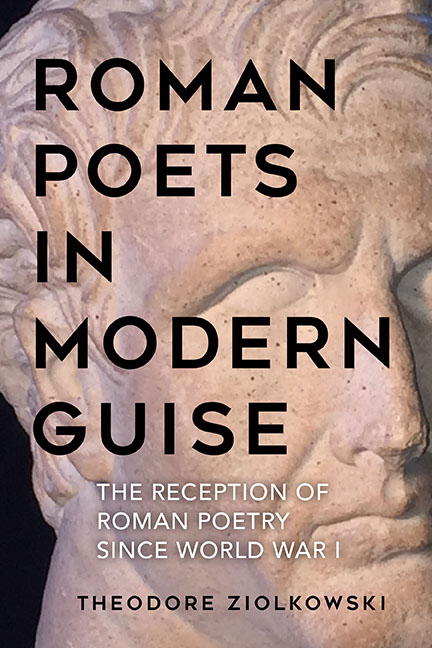Conclusion: Why Roman Poets?
Published online by Cambridge University Press: 21 October 2020
Summary
N ietzsche remarked, as we saw in the preceding chapter, that translations provide a key to a society's values. It can be argued that his observation applies a fortiori to adaptations, which unlike translations belong to the very substance of a writer's oeuvre, offering alternative identities—masks or personae in Pound's vocabulary—as a vehicle for the expression of different aspects of the writer's personality. Indeed, one might well claim that, without a knowledge of the classics, we are unable fully to grasp or appreciate the achievement of many major writers from Ezra Pound to Raoul Schrott, from Paul Valéry to Durs Grünbein. Even writers in whose works the classics play a less predominant role—Thomas Mann, for instance—classical allusions often have a surprising relevance.
Reception and adaptation of the classics is to a considerable extent a generational phenomenon. Writers educated in the first half of the twentieth century, when Greek and Latin still commanded a central position in American and European schools and colleges—Pound, Frost, Tate, Auden, Schröder, Brecht, Gide, Benda—took the classics for granted, and received their training as a routine component of secondary and higher education, oft en as classics majors in college or university. They belonged to a generation for whom the classics, as E. H. Gombrich reminisced, had still been “profoundly assimilated into the tradition of general knowledge.”
Around the time of World War II the situation changed. “We are the first generation of poets not to study Latin,” observed Donald Hall (born 1928). Some writers of his and later generations, to be sure, such as Vagni and Schrott, and notably the novelists—W. G. Hardy, Pierson Dixon, Benita Kane Jaro, Cornelius Hartz—studied classics and took degrees in that field. Others, such as Durs Grünbein, got at least some Latin in secondary school and, while not pursuing it systematically, were motivated for various reasons to return to the classics. Estelle Gilson reports that she was introduced to Juvenal by her husband, who was well read in the classics; Wright came under the influence of Ransom at Kenyon College; Hall found in Horace the paradigm both for his practice of obsessive revision and for his discursive poems; Pinsky devoted himself to the translation of Dante, whose own indispensable mentor was Virgil; Brodsky, even though he claimed his Latin “stinks,” read Horace's Odes in bed at night.
- Type
- Chapter
- Information
- Roman Poets in Modern GuiseThe Reception of Roman Poetry since World War I, pp. 232 - 238Publisher: Boydell & BrewerPrint publication year: 2020



